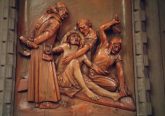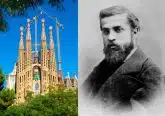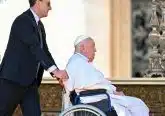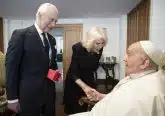Pope Francis says he is close to ‘the dear Cuban people’ after largest protests in decades
by CNA Staff
Vatican City, Jul 18, 2021 / 05:30 am
Pope Francis on Sunday expressed his closeness to “the dear Cuban people” after the largest protests in decades in the communist country.
In his first Angelus address at the Vatican since undergoing colon surgery, the pope said that Cubans were facing “difficult moments” as they struggled with inflation, food shortages, and the coronavirus pandemic.
“I am also near to the dear Cuban people in these difficult moments, in particular to those families suffering the most,” he said, to cheers from pilgrims in St. Peter’s Square holding Cuban flags.
“I pray that the Lord might help the nation construct a society that is more and more just and fraternal through peace, dialogue, and solidarity.”
Referring to Our Lady of Charity of El Cobre, the Patroness of Cuba, the pope added: “I urge all Cubans to entrust themselves to the maternal protection of the Virgin Mary of Charity of Cobre. She will accompany them on this journey.”
Last Sunday, the pope led the Angelus at the Gemelli Hospital in Rome, where he spent 11 days recuperating after surgery.
Pope Francis gave his live-streamed address on July 18 at a window overlooking St. Peter’s Square. The 84-year-old pope’s voice at times sounded weaker than usual and he occasionally had to clear his throat.
In his Angelus address, the pope reflected on the day’s Gospel reading, Mark 6:30-34, in which Jesus invited the Apostles to “come away by yourselves to a deserted place and rest a while.”
The pope said: “His tender invitation — rest a while — should accompany us. Let us beware, brothers and sisters, of efficiency, let us put a halt to the frantic running around dictated by our agendas. Let us learn how to take a break, to turn off the cellphone, to contemplate nature, to regenerate ourselves in dialogue with God.”
The pope noted that Jesus’ words to his disciples after they returned from an arduous mission contained a valuable teaching.
“Even though he rejoices on seeing his disciples’ happiness due to the wonders of their preaching, he does not spend time giving them compliments or asking questions. Rather, he is concerned about their physical and interior tiredness,” he said.
“And why does he do this? Because he wants to make them aware of a danger that is always lurking there for us too: the danger to be caught up in the frenzy of doing things, to fall into the trap of activism where what is most important are the results that we obtain and the feeling of being absolute protagonists.”
He continued: “How many times this happens in the Church: we are busy, we run around, we think that everything depends on us and, in the end, we risk neglecting Jesus and we always make ourselves the center.”
The pope said that this was why Christ called his followers to rest with him.
“It is not only physical rest, but also rest for the heart. For it is not enough to ‘unplug’ ourselves, we need to truly rest. And how do we do this? To do so, we must return to the heart of things: to stop, to remain in silence, to pray so as not to go from the frenzy of work to the frenzy of times of relaxation,” he said.
“Jesus did not neglect the needs of the crowd, but each day, before anything else, he would withdraw in prayer, in silence, in intimacy with the Father.”
Yet, the pope observed, Jesus and the disciples were unable to rest at that time because they were surrounded by crowds. Jesus took pity on the people, who “were like sheep without a shepherd.”
“Touched, Jesus dedicates himself to the people and begins to teach again. This seems to be a contradiction, but in reality, it is not,” he said.
“In fact, only a heart that does not allow itself to be taken over by hastiness is capable of being moved; that is, of not allowing itself to be caught up in itself and by things to do, and is aware of others, of their wounds, their needs.”
The pope continued: “Compassion is born from contemplation. If we learn to truly rest, we become capable of true compassion; if we cultivate a contemplative outlook, we will carry out our activities without that rapacious attitude of those who want to possess and consume everything; if we stay in touch with the Lord and do not anesthetize the deepest part of ourselves, the things to do will not have the power to cause us to get winded or devour us.”
“We need — listen to this — we need an ‘ecology of the heart,’ that is made up of rest, contemplation, and compassion. Let us take advantage of the summertime for this! It will help us quite a bit.”
After praying the Angelus, Pope Francis expressed his solidarity with victims of flooding in Europe that has killed more than 180 people.
“I express my nearness to the populations of Germany, Belgium, and the Netherlands, who were hit by the catastrophic floods. May the Lord welcome the deceased and comfort their loved ones, may he sustain the efforts of everyone who are helping those who have suffered serious damage,” he said.
The pope also lamented violence in South Africa that has claimed the lives of more than 200 people.
“Unfortunately, this last week, news has arrived of episodes of violence that have aggravated the situation of so many of our brothers and sisters in South Africa, already affected by economic and health difficulties due to the pandemic,” he said.
“United to the bishops of the country, I address a heartfelt appeal to all the leaders involved that they might work toward building peace and collaborate with the authorities to provide assistance to those in need.”
“May the desire that has guided the South African people, the rebirth of harmony among all its children, not be forgotten.”
Finally, he greeted young Italian pilgrims in the square below.
He said: “Dear young people, have a blessed journey on the path of the Gospel!”













